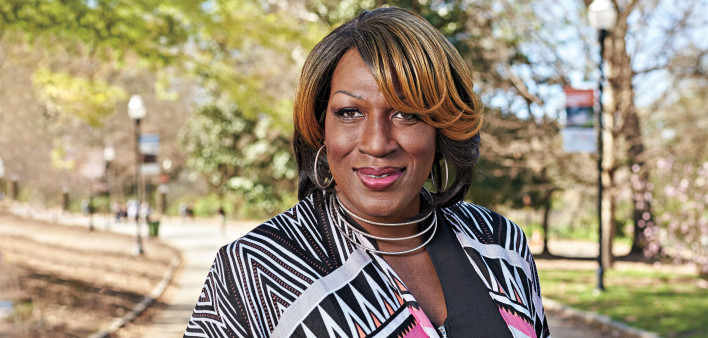Dee Dee Chamblee identified as transgender from an early age, but her family didn’t accept her. So at 15 years old, she turned to sex work to support herself.
In 1987, at age 27, Chamblee tested positive for HIV. “I wasn’t scared,” says the Atlanta native. “I was just waiting for when my turn was going to come because people were dying.”
Following her diagnosis, Chamblee looked to spirituality for solace, and in 1991, she found a support group that showed her love and acceptance and helped feed her spirit.
“I didn’t get into HIV advocacy until I decided that I was tired of being disrespected as a trans woman,” she explains. “That’s when I really came out, because I was not going to tolerate any more being kicked while I was already down.”
In 2000, Chamblee was receiving treatment at Atlanta’s Grady Memorial Hospital when she was hired as a peer counselor in its infectious disease clinic. But the staff at Grady often misgendered her and refused to call her by her chosen name. Chamblee took her grievances to a higher-up; soon thereafter, a new policy protecting the rights of trans people was instituted.
Today, Chamblee is the executive director of LaGender, Inc., a group she founded in 2001 to address the unique needs of the Metro Atlanta transgender community, specifically trans women of color. The organization focuses on HIV, homelessness, incarceration and discrimination, among other issues.
“Our population is the most impacted by HIV,” she says, referring to Black trans women. With an infection rate this high, she notes, it’s like the annihilation of an entire community.
LaGender provides services including outreach networking, peer counseling, support groups, leadership development and more.
In 2011, President Obama selected Chamblee as a Champion of Change in honor of the 30th anniversary of the AIDS epidemic.
Chamblee was also the first transgender woman to be inducted into SisterLove’s 2020 Leading Women’s Society in 2012. She was most recently honored with a Positive Leadership Award at AIDSWatch 2019.
She is currently involved with Solutions Not Punishment, a Black- and trans-led coalition she helped launch in 2013 to block an ordinance increasing the criminalization of survival sex workers in Midtown Atlanta and banning those convicted of sex work from the city.
“We were formed out of the Black trans women who were being profiled by the police,” she says regarding the group’s origins.
Chamblee hopes to use her advocacy to address some of the most pressing issues trans people living with HIV must contend with—namely, aging, linkage to care and mental health.
“You just have to get out there,” Chamblee says. “Once you get out there, you will find where you can get support to get where you need to be.”







Comments
Comments